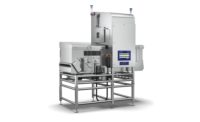Food With Integrity
BONUS FEATURE
Food with Integrity
by Lynn Petrak, contributing editor
Product quality is not just a marketing mantra for Chipotle Mexican Grill, but a menu philosophy tied to specific environmental and animal-husbandry mandates.
Those who sit down to a lunch, dinner or a snack at Chipotle Mexican Grill can learn a lot about what they are putting into their mouths by simply reading the short stories on cups and napkins in front of them. Indeed, instead of mere pithy slogans, customers gain valuable insight into the Denver, Colo.-based company’s supply-chain program.
One story entitled “Unchained” imparts Chipotle’s approach to sourcing ingredients printed on fountain drink cups. “Because of our size, we can influence for the better how livestock is raised,” it states in part. Other cups, meanwhile, are printed with information about individual farmers and ranchers who grow the restaurant chain’s products.
Sharing supply-chain components with consumers is a Chipotle philosophy whose cornerstone is about extending the chain’s message about the quality of its menu items. “We didn’t do it initially as a marketing strategy,” says company spokesman Chris Arnold of the hand-held marketing materials. “As we’ve sort of expanded our efforts with this whole idea of what we call ‘Food with Integrity’, it has matured and become a guiding principle of the way we do business and produce food.”
According to Arnold, consumers are not only hungry for high-quality foods, but for information about those foods. “We find ourselves part of an agrarian movement, with consumers more concerned about how food is grown and delivered to them. You only have to look at the success of places like Whole Foods, Wild Oats and Trader Joe’s and even in mainstream supermarkets, where organic food is the greatest growing section, to see that there is a greater awareness and growing sense of importance of the issues surrounding raising food,” he says.
“Food with Integrity” evolves
As Arnold notes, the “Food with Integrity” program at Chipotle began, well, rather organically.
A few years ago, after enjoying ongoing success since its founding in 1993, executives at Chipotle were looking at how to improve a particular product, the shredded pork used for company burritos, hard and soft tacos and burrito bowl salads. ”It was borne out of having a menu item that wasn’t selling well — our carnitas. In looking to make that better, we found the farmers of Niman Ranch. We happened on them through an article in a magazine that led us to try the pork,” Arnold recalls.
Chipotle chief executive officer Steven Ells made the choice personally. “Steve ordered the pork to cook with and loved it, and he visited the farm and saw what he liked. He said, ‘This is the type of thing we should be doing and supporting,’” says Arnold. What so impressed Ells, in addition to the quality of Niman Ranch pork, was the way in which the Calif.-based company raised its animals, from feeding practices to the land on which the hogs roamed.
Beyond reflecting what Chipotle considers the right thing to do from an animal welfare standpoint, such practices also correlate directly to finished product eating experience, notes Arnold. “I think it makes a significant difference. When you raise animals the way the Niman Ranch farmers are raising them, the meat ends up being better. There is more back fat on the animals to help them weather the elements and they have exercise that makes for better pork,” he says, adding, “But ultimately and more importantly, they live enjoyable lives because they are all on open pasture and deeply bedded barns where they get to be pigs. There really is something to that husbandry.”
The Niman Ranch experience was an “aha moment” with a ripple effect throughout the Chipotle supply chain, according to Arnold. “After we did that, we felt that fresh wasn’t important enough, that we have to buy ingredients that not only taste good but come from good sources, where animals are raised in a humane way. There also has to be respect for people who raise the animals and grow the product,” he remarks.
As with pork (which is also provided by other ranchers and processors, such as the Canadian supplier duBreton Farms) the manner in which all proteins on the menu at Chipotle are produced became a focus. Most of the chicken on the menu is supplied by Bell & Evans of Fredericksburg, Pa., which also supplies to natural and organic retailers like Whole Foods. Chipotle gets its beef primarily from Loveland, Colo.-based Meyer Natural Angus and Golden, Colo.-based Coleman Natural Meats, in addition to smaller processors, that can meet demand yet still provide product that is natural and raised in a humane, safe manner.
Chipotle’s “Food with Integrity” concept doesn’t end with meat and poultry items. Other animal-based products are sourced with a similar approach. “All of the sour cream we are buying is free of [recombinant bovine growth hormone] and our plan is to have the same for our cheese,” relates Arnold. “We’re concerned about any additives and are very much of the mind that not having them is better than having them.”
Meanwhile, also promoted on the restaurant’s cups is the story of how Chipotle buys organic beans and is generally helping to increase the organic bean marketplace “This year, 25 percent of the beans we buy will be organically grown. That percentage has been steadily but slowly increasing,” notes Arnold, adding that the company bought 750,000 pounds of organic beans last year, a 250,000-pound increase over the previous year.
The issues involved with being able to source enough organic beans are something that Chipotle grapples with across its supply chain.
“Today, all the pork we serve is naturally raised, while a little more than half of our chicken is naturally raised and 50 percent of beef is naturally raised. We are not across the board because we can’t get the supply in the way we need, but we keep growing it over time by helping current suppliers grow, identifying new suppliers and in some case working with suppliers to change practices,” Arnold explains, adding, “We are committed to taking this journey one step at a time.”
Chipotle’s influence expands
The innovative way that Chipotle Mexican Grill sources ingredients goes beyond its own menu and organization. To varying degrees, effects have been felt by its suppliers, its competitors and other processors in the meat and poultry industry.
Success has been a two-way street with Niman Ranch, for example. “When we started that relationship, Niman had fewer than 50 hog farmers participating in their program and today they have more than 500,” recounts Arnold.
Within the pork industry, meantime, what’s going on at Niman Ranch has not gone unnoticed. As Arnold points out, Smithfield Foods recently announced that the company is making changes to some of its practices. “That is an enormous step forward in the hog world,” he notes. Elsewhere in the food chain, the bean industry has felt some reverberations from demand via Chipotle, as its producers are ramping up efforts to increase the supply of organic beans.
Back in Denver, Arnold says that the company takes the role it has carved out seriously. “The more Chipotle can do with ‘Food with Integrity’, the bigger part we can play,” he observes.
Looking for a reprint of this article?
From high-res PDFs to custom plaques, order your copy today!





